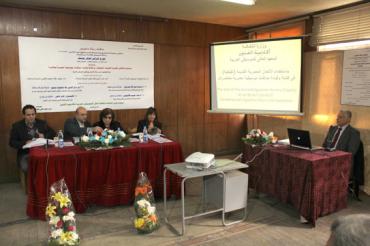Whatever happened to the music of ancient Egypt? While scenes of every aspect of Egyptian life remain on the walls of tombs and temples for generations to see, sounds are quite another matter.
Musicologists are almost unanimously of the opinion that the music of ancient Egypt never died out, but is still alive in Egypt. It reveals itself in folk music and, most conspicuously, in the music of the Coptic Church. In fact, many melodies used in praise and services are traced back to services in Pharaonic temples. The sounds are still uniquely distinctive, yet also exclusively Coptic.
20th-century efforts
The Coptic Church, for its part, has jealously guarded its musical heritage over the centuries, rejecting any attempt at corrupting it. It took until the late 20th century for the inspired musicologist Ragheb Moftah (1898 – 2001) to embark on an endeavour to transcribe Coptic melodies in musical notation. Working with Dr Moftah were Ernest Newland-Smith, Margit Toth and Martha Roy.
The 20th century saw the emergence of a generation of Egyptian musicologists and composers who took Egyptian contemporary composition to a world level. Among them were Aziz al-Shawwan, Kamel al-Remali, and Gamal Heshmat.
A few scholars of Coptic music began tackling the question of using Coptic musical phrases or themes as base for contemporary compositions. Pioneering among them was Adel Kamel (1942 – 2003), whose work in that regard earned him a PhD from the Institute of Coptic Studies in Cairo in 1996. That year he composed Agios, and Fugue on Coptic Theme which was based on the Coptic Golgotha theme, and in 2002 he wrote his Mélodie Copte. Dr Kamel was from October 1987 and till his sudden death in October 2003 editor of Watani’s music, cinema, and theatre page to which he gave the title Panorama.
.JPG)
The charm of Coptic
A study by music scholar George Kyrillos on the use of ancient Egyptian (Coptic) hymns in contemporary Egyptian music was recently discussed at the Academy of the Arts in Cairo. Mr Kyrillos was granted a Masters degree with honours for his work, which was supervised by professors Linda Fathalla Gabrawi, Ezz El Din Slim and Mohamed Alaa Fathi of the High Institute for Arabic Music. Sharing in the discussion and assessment of the thesis were the musicologist Hanaa’ Tanious and the technical manager and conductor of the Cairo Opera Orchestra Nayer Nagy.
Mr Kyrillos started off by earning a degree in engineering in 1981, but went on to study music at Trinity College, Cambridge, in 1983 and later majored in conducting. He taught and lectured on Egyptian and Coptic music in Egyptian universities, as well as in Russia and Serbia. He wrote the book Al-Alhaan al-Qibtiya, Mouseeqaha wa Ruhaniyatiha (Coptic Music, Its Music and Spirituality), and worked on rigorously transcribing in music notation a large number of Coptic melodies. But perhaps the achievement Mr Kyrillos is most famous for is his David Ensemble which he founded back in 1976 to perform Coptic music and hymns, and which grew to command high repute inside and outside Egypt. The ensemble has performed in Paris, Marseille, Stockholm, Frankfurt, Hanover, Milan, Venice, Rome, Moscow, St Petersburg, Nice, and Athens.
Richly diverse
Through his analysis of Coptic hymns, Mr Kyrillos noticed the significant diversity in the methods of formulation, performance and cadences, as well as the diversity and modulation in maqamat (pattern of notes in Arab music), and the speed and rhythms of the musical sentences. The duration of hymns, methods of performance, formulation styles and scales of these hymns, he noted, were also richly diverse.
From here, according to Mr Kyrillos, the idea arose of researching the diversity and complexity of Coptic musical heritage, a cappella and monophonic, and to carry this effort into composing innovative musical compositions that drew on the ancient Coptic music. This would mean marrying the polyphony and homophony (multiple sounds) of contemporary musical methodology with the original a cappella (single voice) and monophony (single instrument) of Coptic music, to produce various instrumental configurations to which traditional instruments such as the nay (flute) and oud (lute) may be added. The conducting styles and patterns for these configurations were also the subject of Mr Kyrillos’s study.
Mr Kyrillos again observed that the issue of conducting in the various liturgical rites of Coptic music year-round was a spontaneous art that had never been subject to academic study. He thus decided to undertake the task of researching the conducting styles in ancient Egyptian (Coptic) music and their development for use in the various rituals of Coptic hymns. This he did through the selection of a sample of ancient Coptic hymns preserved in the Egyptian Coptic Church.
Conducting techniques
In his study, Mr Kyrillos pursued the descriptive method, surveyed studies (content analysis) and using recordings of Coptic music and the music notation of the research music samples, which he transcribed himself, from the first to the 7th century AD in Egypt. This was recorded at the Institute of Coptic Studies and the David Ensemble of which Mr Kyrillos is the founder and conductor. He also canvassed expert opinion with respect to his innovative music composition.
As far as conducting techniques in ancient Coptic music, Mr Kyrillos sifted through what he calls “Front and Rear Conducting” and “Indirect Conducting in the Coptic Church”, which enable the cantor indirectly to control the congregation behind him. He embarked on the task of lifting the obscurity that surrounds Coptic hymns and interpreting them to the public in a simplified manner, different from his interpretation to the musicians. In this process, the conductor has to glance quickly at the audience while conducting the musicians and singers, watching out for audience reactions to the concert and their interaction with the maestro.
This peripheral glancing process is similar to that which the musicians in the orchestra and the singers use to glimpse the conductor’s signals.
It also includes searching for the importance of conducting in the ritual church processions of the Egyptian Church, which involves going round the nave or the altar, and which requires a careful and more focused way of conducting.
.JPG)
New compositions
“Not by inspiration only will there be music, not by inspiration only can a composer formulate a beautiful musical masterpiece; he must rely on effort, perseverance, study, science and knowledge-seeking.” This is how Mr Kyrillos describes his research on the composition of music using Coptic melodies as a base.
There are, he explains, spontaneous composers who rely mainly on inspiration, constructive composers who rely on inspiration by finding the main motif (theme) and then completing their composition by their own effort, and traditionalist composers who start with the music style not the motif; these composers possess methods and techniques of composition that are new, mature and fully developed, and which continue to evolve throughout history. There are also the revolutionary composers who come up with what is new, even if radical and might even be branded as taboo or difficult to understand, and which eventually has a profound impact on the future generations.
The applied study included the musical tools and composition methods used by the composer to write a contemporary musical composition using ancient Egyptian musical motifs (Coptic). Mr Kyrillos uses the four ancient Egyptian hymns Kata Nix’oroc, Eic `O pan`agioc Pat3r, Ontoc `Al30wc and `Okurioc Metacou to write contemporary pieces of Egyptian Music.
If the trend envisioned by Mr Kyrillos and his Egyptian predecessors take off, will there come a day when the entire world would again hear the sounds of ancient Egypt, this time resonating in concert halls?
Watani International
23 February 2014
















